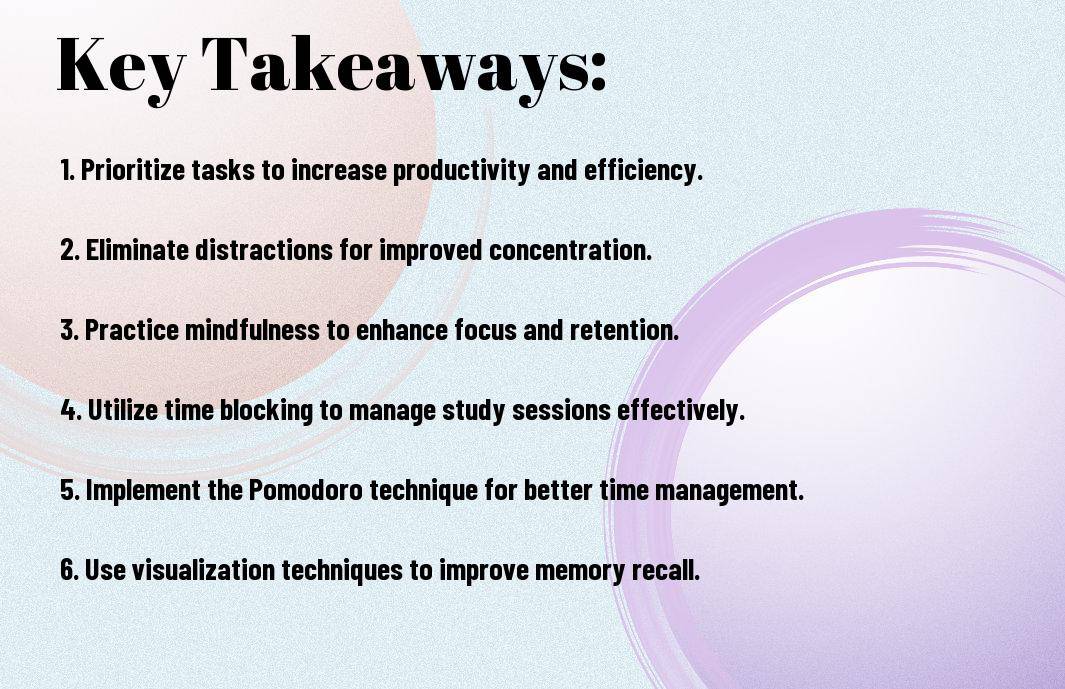
Newsletter Subscribe
Enter your email address below and subscribe to our newsletter

Enter your email address below and subscribe to our newsletter

Are you looking to take your study sessions to the next level? Focus methods can be the game-changer you need to truly enhance your learning experience. By adapting various techniques and strategies, you can effectively train your brain to concentrate better, retain information longer, and ultimately improve your academic performance. In this blog post, we will explore the powerful impact of focus methods on your studying and provide practical tips on how to incorporate them into your routine.

Even the most diligent students can struggle with maintaining focus while studying. Understanding the science behind focus can help you improve your study sessions and achieve better results.
With advances in neuroscience, we now know that focus is controlled by the prefrontal cortex of the brain. This area is responsible for managing attention, decision-making, and impulse control. When you understand how your brain functions in relation to focus, you can implement strategies to enhance your concentration and productivity.
Focus is a skill that can be developed with practice and dedication. One common myth is that some people are naturally gifted with the ability to concentrate for long periods, while others are not. This misconception can be discouraging for those who struggle with focus. In reality, anyone can improve their focus through consistent practice and the right techniques.
It is not true that multitasking is an effective way to enhance productivity. Many people believe that juggling multiple tasks simultaneously can make them more efficient, but in fact, it can lead to decreased performance and increased errors. Focus is about quality over quantity, and giving your full attention to one task at a time can lead to better results.
Many students underestimate the power of their study environment when it comes to their academic performance. Creating a space that fosters concentration and productivity is key to achieving success in your studies. By optimizing your study environment, you can enhance your focus and make the most of your study sessions.
To set up the ideal study space, find a quiet area with good lighting and ventilation. Ensure your desk or table is clutter-free and organized, with all the necessary materials within reach. Personalize your study space with motivational quotes, plants, or calming scents to create a positive atmosphere. Having a comfortable chair and an ergonomic setup can also help you stay focused for longer periods.
Space is an imperative aspect of creating a conducive study environment. Remove any distractions such as mobile phones, social media notifications, or noisy surroundings. Consider using noise-canceling headphones or playing instrumental music to block out external disturbances. If possible, inform your housemates or family members about your study schedule to minimize interruptions. Creating a designated study area away from high-traffic areas can also help in staying focused.
Environment: Bear in mind, your study environment greatly impacts your ability to concentrate and retain information. By setting up a conducive space and eliminating distractions, you can boost your productivity and make your study sessions more effective. Take the time to craft the perfect study environment that works best for you, and watch how it revolutionizes your learning experience.
All successful study sessions start with an effective time management strategy. The Pomodoro Technique is a popular method that can help you maximize your focus and productivity. This technique involves breaking your study time into intervals, typically 25 minutes long, separated by short breaks. After four intervals, take a longer break. This method can help you stay refreshed and maintain a high level of concentration throughout your study session.
Any student looking to boost their study productivity should consider the Time Blocking Method. This technique involves scheduling specific blocks of time for different tasks or subjects throughout your day. By dedicating focused time periods to each task, you can eliminate distractions and stay on track with your study goals. Whether it’s allocating an hour for reading, another hour for practice questions, or a block of time for reviewing notes, this method can help you make the most of your study time.
Management: With the Time Blocking Method, you can clearly see how your day is structured and ensure that you dedicate adequate time to each study subject. By creating a detailed study schedule, you can prioritize your tasks effectively and ensure that you cover all the necessary material.
Time management is crucial for academic success, and setting study milestones can help you track your progress and stay motivated. Break down your study goals into smaller, achievable milestones that you can work towards each day or week. Whether it’s completing a set number of practice questions, finishing a chapter, or mastering a specific concept, setting study milestones can help you stay focused and motivated throughout your study journey.
Time: Setting study milestones not only helps you track your progress but also provides a sense of accomplishment as you reach each milestone. Celebrate your achievements, no matter how small, as each one brings you closer to your larger goals.
It is important to experiment with different time management techniques to find what works best for you. Whether you prefer the structured intervals of the Pomodoro Technique, the focused blocks of the Time Blocking Method, or the motivational boost of setting study milestones, incorporating these techniques into your study routine can revolutionize your approach to learning. Stay consistent, stay focused, and watch your study habits transform for the better!
Despite the multitude of distractions that students face today, mastering the art of focus is possible through mindfulness. By incorporating mindfulness practices into your study routine, you can enhance your concentration, memory retention, and overall learning experience.
On a fundamental level, mindfulness involves being present and fully engaged in the moment. When applied to studying, this means directing your attention to the task at hand without being pulled away by thoughts of the past or worries about the future. By cultivating mindfulness, students can improve their ability to focus, comprehend complex information, and manage stress effectively.
To incorporate mindfulness into your study routine, try starting with short breathing exercises to center yourself before submerging into your work. Another effective technique is body scan meditation, where you systematically focus on each part of your body to release tension and promote relaxation. Additionally, practicing mindfulness while walking or eating can help you build the habit of staying present in various daily activities.
Learning to be mindful doesn’t require hours of intense meditation. A few minutes of mindfulness exercises each day can make a significant impact on your ability to concentrate and absorb information effectively. By integrating these simple mindfulness practices into your study routine, you can unlock your full potential and revolutionize your learning experience.
For students looking to boost their focus and concentration levels, paying attention to what you eat can make a significant difference. Incorporating brain-boosting foods into your diet can help enhance cognitive function and improve your study sessions. Here are some nutritional tips to help you stay sharp and focused:
For improved concentration, consider incorporating omega-3 fatty acids found in fish, nuts, and seeds into your meals. These important fats are crucial for brain health and can help enhance focus and memory. Additionally, foods rich in antioxidants such as blueberries, spinach, and kale can help protect the brain from oxidative stress and improve cognitive function.
For optimal cognitive function, staying hydrated is important. Dehydration can lead to brain fog and impaired focus, so make sure to drink an adequate amount of water throughout the day. Additionally, incorporating hydration-rich foods such as watermelon, cucumber, and celery into your diet can help maintain proper hydration levels and support cognitive function.
Concentration is key when it comes to successful studying. By paying attention to your nutritional intake and staying hydrated, you can enhance your focus and improve your academic performance.
Your study sessions can benefit greatly from using digital tools that help you stay organized. Tools like Notion and Trello offer customizable features to create to-do lists, track deadlines, and manage projects efficiently. With these tools, you can break down your study goals into manageable tasks, set reminders, and collaborate with study partners easily.
Your focus during study sessions is crucial for effective learning. Apps like Forest and Be Focused are designed to help you stay on track by blocking distractions and implementing time management techniques such as the Pomodoro method. These apps track your study time, provide reminders for breaks, and create a productive environment to enhance your concentration.
Another method to maintain focus during studying is to limit access to social media platforms and other distracting websites. By using website blockers like StayFocusd or Freedom, you can restrict your access to these sites during your study sessions, increasing your productivity and minimizing distractions.

Keep your motivation high and your focus sharp to excel in your studies. It’s easy to get distracted or lose sight of your goals, but with the right strategies, you can stay on track and achieve great success.
Motivated by setting both short-term and long-term goals. Short-term goals help you stay focused day to day, while long-term goals give you a sense of direction and purpose. Be specific in what you want to achieve and break down your goals into manageable tasks. Celebrate small victories along the way to keep your motivation levels high.
Setting up a reward system can be a powerful way to stay motivated. Decide on rewards for reaching different milestones in your study journey. Whether it’s treating yourself to a movie night after completing a challenging assignment or taking a weekend getaway after finishing a semester, these incentives can keep you motivated and eager to push through.
This system reinforces positive behavior and provides a light at the end of the tunnel during intense study sessions. Remember to choose rewards that truly inspire you and make you happy, helping you stay committed to your academic goals.
Once again, let’s probe deeper into the art of focus methods to revolutionize your study habits. Here are some advanced concentration strategies to help you enhance your productivity:
| Technique | Description |
| Pomodoro Technique | Work for 25 minutes, then take a 5-minute break |
| Block Scheduling | Allocate specific time blocks for focused work |
To truly engage in deep work, you need to eliminate distractions and immerse yourself completely in the task at hand. This means focusing intently on the task without multitasking or being disrupted by external factors. By practicing deep work regularly, you can train your brain to work at its highest capacity and achieve more in less time.
| Technique | Description |
| Set Specific Goals | Establish clear objectives for each practice session |
| Receive Feedback | Seek input from mentors or experts to improve |
Deliberate practice involves focusing on specific aspects of your skills and continuously challenging yourself to improve. It requires intense concentration and effort to push beyond your current abilities and reach new heights of mastery. By intentionally practicing in a focused manner, you can accelerate your learning and skill development.
For instance, a musician may focus on perfecting a challenging piece of music by breaking it down into smaller sections and practicing each part meticulously. This deliberate approach allows them to pinpoint areas for improvement and refine their technique until they achieve mastery in performance.
To ensure you are on the right track with your study methods, it is crucial to regularly assess your progress. Pay attention to key indicators such as your understanding of the material, grades on assessments, and your ability to retain information. Reflect on what is working well and what could be improved upon. If you are not seeing the results you desire, it may be time to consider making some adjustments.
To continue enhancing your study methods, be open to making adjustments as needed to achieve your academic goals. This could involve experimenting with different study techniques, revising your study schedule, or seeking help from a tutor or study group. Be mindful of, the goal is not perfection, but progress. By continually refining your study methods, you are setting yourself up for success in the long run.
One key aspect of making adjustments for continuous improvement is being flexible and willing to try new approaches. What works for one person may not work for another, so it’s important to tailor your methods to what best suits your learning style and preferences.
Hence, by implementing the insightful methods outlined in The Art Of Focus: Official Book Summary By The … – Dan Koe, you can revolutionize your study habits and improve your focus. Embracing these techniques can help you enhance your productivity, efficiency, and overall success in your academic pursuits.
Don’t underestimate the power of focus in your study routine. With the right strategies and mindset, you can achieve your academic goals and excel in your learning journey. It’s time to take control of your focus and study smarter, not harder!
A: The Art of Focus Methods is a set of techniques and strategies designed to help individuals improve their focus and concentration while studying.
A: Focus is necessary for studying because it allows you to absorb information more effectively, retain knowledge better, and ultimately perform better academically.
A: The Art of Focus Methods can help you by providing practical tips and exercises that can enhance your ability to concentrate, minimize distractions, and boost your productivity while studying.
A: Yes, The Art of Focus Methods can benefit all types of learners, whether you are a visual, auditory, or kinesthetic learner. The techniques can be tailored to suit your individual learning style.
A: Absolutely! The techniques in The Art of Focus Methods are versatile and can be applied to both traditional classroom settings and online studying environments.
A: The timeline for seeing improvements in focus may vary for each individual, but with consistent practice of the methods provided, many people notice positive changes in their focus within a few weeks.
A: Not at all! The techniques in The Art of Focus Methods are easy to understand and implement. With a bit of practice and dedication, you can quickly incorporate them into your study routine.